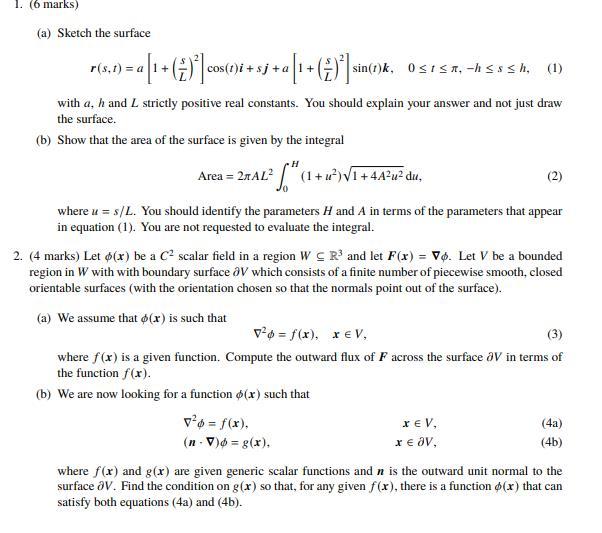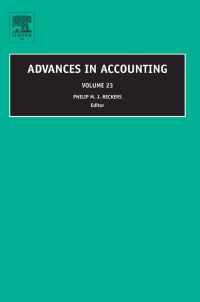
1. (6 marks) (a) Sketch the surface P(5.) =a[i+ (3) |cos()i + sj +a[1+ (2)"}sino)k, osisa, -hsosh(1) with a, h and L strictly positive real constants. You should explain your answer and not just draw the surface. (b) Show that the area of the surface is given by the integral Area = 2nAl"(1?)/1+48?w? du, (2) where u = 5/L. You should identify the parameters H and A in terms of the parameters that appear in equation (1). You are not requested to evaluate the integral. 2. (4 marks) Let $(x) be a scalar field in a region W SR and let F(x) = V. Let V be a bounded region in W with with boundary surface V which consists of a finite number of piecewise smooth, closed orientable surfaces (with the orientation chosen so that the normals point out of the surface). (a) We assume that $(x) is such that V20 = f(x), reV, (3) where f(x) is a given function. Compute the outward flux of F across the surface av in terms of the function f(x). b) We are now looking for a function $(x) such that v'o = f(x), XEV, (4a) (n. 5) = g(x). xe av, (4b) where f(x) and g(x) are given generic scalar functions and n is the outward unit normal to the surface V. Find the condition on g(x) so that, for any given f(x), there is a function $(x) that can satisfy both equations (4a) and (4b). 1. (6 marks) (a) Sketch the surface P(5.) =a[i+ (3) |cos()i + sj +a[1+ (2)"}sino)k, osisa, -hsosh(1) with a, h and L strictly positive real constants. You should explain your answer and not just draw the surface. (b) Show that the area of the surface is given by the integral Area = 2nAl"(1?)/1+48?w? du, (2) where u = 5/L. You should identify the parameters H and A in terms of the parameters that appear in equation (1). You are not requested to evaluate the integral. 2. (4 marks) Let $(x) be a scalar field in a region W SR and let F(x) = V. Let V be a bounded region in W with with boundary surface V which consists of a finite number of piecewise smooth, closed orientable surfaces (with the orientation chosen so that the normals point out of the surface). (a) We assume that $(x) is such that V20 = f(x), reV, (3) where f(x) is a given function. Compute the outward flux of F across the surface av in terms of the function f(x). b) We are now looking for a function $(x) such that v'o = f(x), XEV, (4a) (n. 5) = g(x). xe av, (4b) where f(x) and g(x) are given generic scalar functions and n is the outward unit normal to the surface V. Find the condition on g(x) so that, for any given f(x), there is a function $(x) that can satisfy both equations (4a) and (4b)







